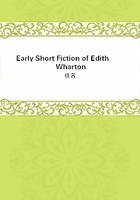
第81章
"I was not a young girl, to begin with. It is perfectly unfitting that young girls should be present at--at such times--should hear such things discussed--"
"I thought you considered it one of the deepest social wrongs that such things never ARE discussed before young girls; but that is beside the point, for I don't remember seeing any young girl in my audience to-day--"
"Except Una Van Sideren!"
He turned slightly and pushed back the lamp at his elbow.
"Oh, Miss Van Sideren--naturally--"
"Why naturally?"
"The daughter of the house--would you have had her sent out with her governess?"
"If I had a daughter I should not allow such things to go on in my house!"
Westall, stroking his mustache, leaned back with a faint smile.
"I fancy Miss Van Sideren is quite capable of taking care of herself."
"No girl knows how to take care of herself--till it's too late."
"And yet you would deliberately deny her the surest means of self-defence?"
"What do you call the surest means of self-defence?"
"Some preliminary knowledge of human nature in its relation to the marriage tie."
She made an impatient gesture. "How should you like to marry that kind of a girl?"
"Immensely--if she were my kind of girl in other respects."
She took up the argument at another point.
"You are quite mistaken if you think such talk does not affect young girls. Una was in a state of the most absurd exaltation--"
She broke off, wondering why she had spoken.
Westall reopened a magazine which he had laid aside at the beginning of their discussion. "What you tell me is immensely flattering to my oratorical talent--but I fear you overrate its effect. I can assure you that Miss Van Sideren doesn't have to have her thinking done for her. She's quite capable of doing it herself."
"You seem very familiar with her mental processes!" flashed unguardedly from his wife.
He looked up quietly from the pages he was cutting.
"I should like to be," he answered. "She interests me."
II
If there be a distinction in being misunderstood, it was one denied to Julia Westall when she left her first husband. Every one was ready to excuse and even to defend her. The world she adorned agreed that John Arment was "impossible," and hostesses gave a sigh of relief at the thought that it would no longer be necessary to ask him to dine.
There had been no scandal connected with the divorce: neither side had accused the other of the offence euphemistically described as "statutory." The Arments had indeed been obliged to transfer their allegiance to a State which recognized desertion as a cause for divorce, and construed the term so liberally that the seeds of desertion were shown to exist in every union. Even Mrs. Arment's second marriage did not make traditional morality stir in its sleep. It was known that she had not met her second husband till after she had parted from the first, and she had, moreover, replaced a rich man by a poor one. Though Clement Westall was acknowledged to be a rising lawyer, it was generally felt that his fortunes would not rise as rapidly as his reputation. The Westalls would probably always have to live quietly and go out to dinner in cabs. Could there be better evidence of Mrs. Arment's complete disinterestedness?
If the reasoning by which her friends justified her course was somewhat cruder and less complex than her own elucidation of the matter, both explanations led to the same conclusion: John Arment was impossible. The only difference was that, to his wife, his impossibility was something deeper than a social disqualification. She had once said, in ironical defence of her marriage, that it had at least preserved her from the necessity of sitting next to him at dinner; but she had not then realized at what cost the immunity was purchased. John Arment was impossible; but the sting of his impossibility lay in the fact that he made it impossible for those about him to be other than himself. By an unconscious process of elimination he had excluded from the world everything of which he did not feel a personal need: had become, as it were, a climate in which only his own requirements survived. This might seem to imply a deliberate selfishness; but there was nothing deliberate about Arment. He was as instinctive as an animal or a child. It was this childish element in his nature which sometimes for a moment unsettled his wife's estimate of him. Was it possible that he was simply undeveloped, that he had delayed, somewhat longer than is usual, the laborious process of growing up? He had the kind of sporadic shrewdness which causes it to be said of a dull man that he is "no fool"; and it was this quality that his wife found most trying. Even to the naturalist it is annoying to have his deductions disturbed by some unforeseen aberrancy of form or function; and how much more so to the wife whose estimate of herself is inevitably bound up with her judgment of her husband!
Arment's shrewdness did not, indeed, imply any latent intellectual power; it suggested, rather, potentialities of feeling, of suffering, perhaps, in a blind rudimentary way, on which Julia's sensibilities naturally declined to linger. She so fully understood her own reasons for leaving him that she disliked to think they were not as comprehensible to her husband.
She was haunted, in her analytic moments, by the look of perplexity, too inarticulate for words, with which he had acquiesced to her explanations.